On September 24, 2024, as part of the collaboration between the National Economics University and the United Nations Development Programme (UNDP) in Vietnam, a successful seminar was held on "Internal Migration in the Red River Delta and Mekong Delta: Current Issues and Policy Implications."
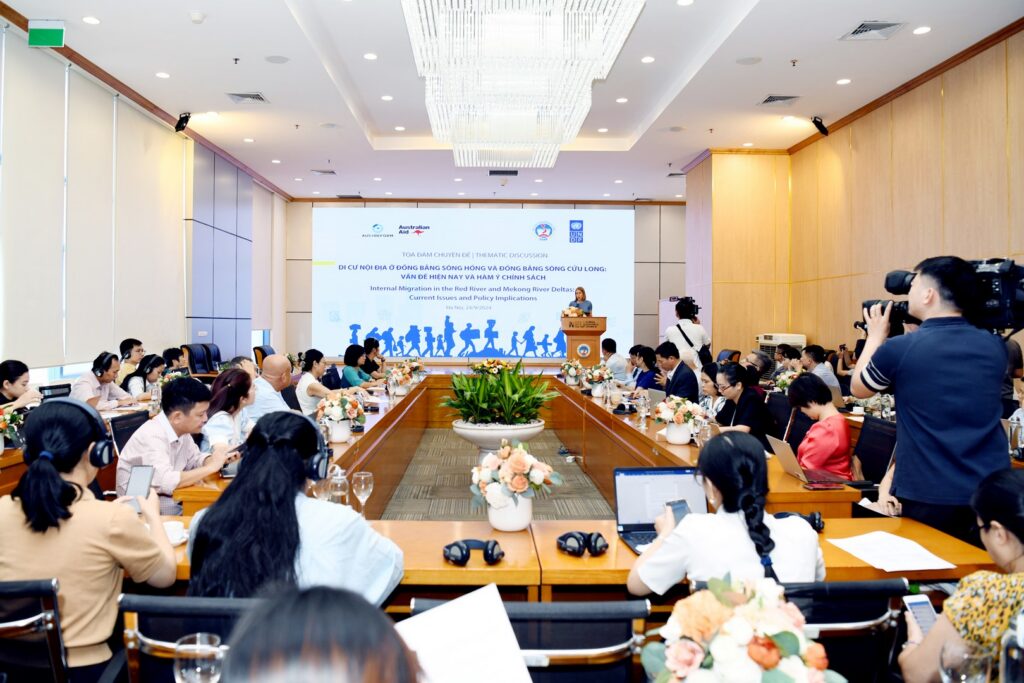
Seminar overview
The purpose of this seminar was to share and discuss the research findings on migration conducted jointly by the Institute for Sustainable Development (under the National Economics University) and UNDP in Vietnam over the recent period, with funding support from the Australian Department of Foreign Affairs and Trade (DFAT) through the Public Administration Performance Index (PAPI) research program.
Attending the seminar from UNDP were: Ms. Do Le Thu Ngoc, Assistant Resident Representative and Head of Inclusive Growth Unit; Ms. Sabina Stein, Assistant Resident Representative and Head of Governance and Participation Unit; and Ms. Do Thanh Huyen, Public Policy Analysis Specialist at UNDP Vietnam. Among the invited guests were: Mr. Ngo Xuan Lieu, Director of the National Center for Employment Services, Ministry of Labour, Invalids and Social Affairs; Dr. Nghiem Thi Thuy from the Institute of Sociology, Vietnam Academy of Social Sciences; Dr. Bui Thai Quyen, Deputy Head of Planning and External Relations Department, Institute of Labour Science and Social Affairs, Ministry of Labour, Invalids and Social Affairs; Prof. Dr. Nguyen Anh Tri, National Assembly Deputy and Member of the Social Affairs Committee of the National Assembly of the Socialist Republic of Vietnam; Dr. Tran Ngoc Dien, Former Editor-in-Chief of Labour & Social Affairs Magazine, Ministry of Labour, Invalids and Social Affairs; along with journalists and television reporters who attended and covered the seminar.
Representing the National Economics University were: Assoc. Prof. Dr. Nguyen Thanh Hieu, Vice Rector; Assoc. Prof. Dr. Le Quang Canh, Director of the Institute for Sustainable Development; together with representatives from various departments, faculties, institutes, centers, scientists, and graduate students from within and outside the university.
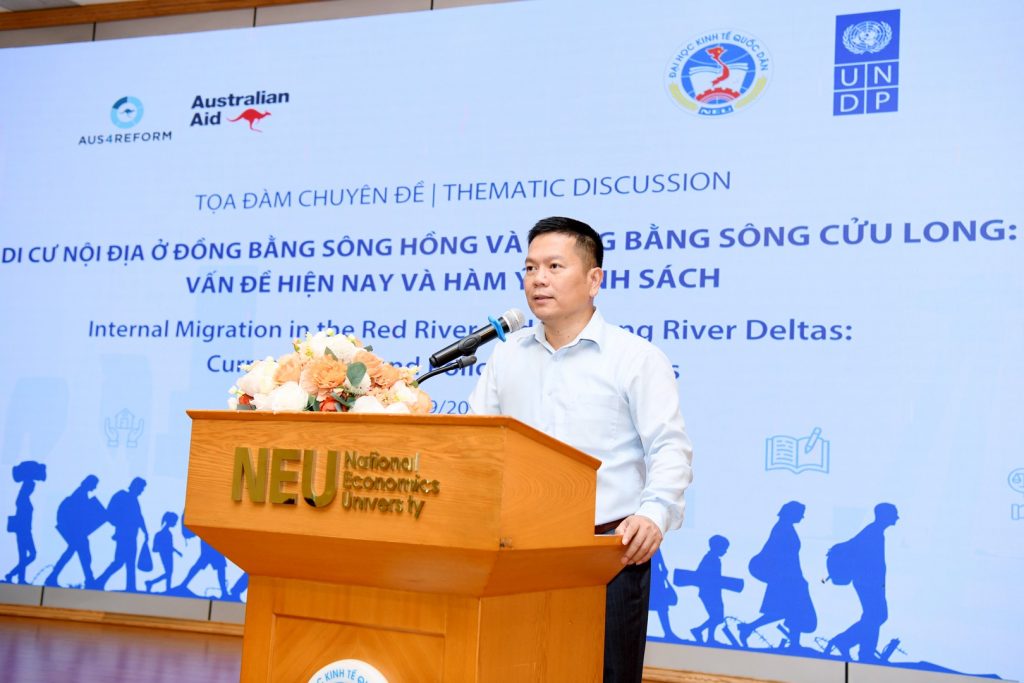
Assoc. Prof. Dr. Nguyen Thanh Hieu, Vice Rector of the National Economics University, delivering the opening remarks
In his opening remarks at the seminar, Assoc. Prof. Dr. Nguyen Thanh Hieu, Vice Rector of the National Economics University, welcomed all delegates and Vietnamese scientists attending the research results presentation seminar.
The seminar was organized in the context where the two delta regions of the Red River and Mekong River are experiencing widespread but spatially different industrialization and urbanization processes. This creates regions with varying "pull" and "push" migration forces, leading to different challenges in managing intra-regional migration in Vietnam's two largest delta regions. Furthermore, migration is a multidimensional issue that requires examination from multiple perspectives and different stakeholders. Besides industrialization, urbanization, poverty, and demographic changes, migration determinants may also stem from lifestyle-related phenomena and climate change, particularly in the Mekong Delta. Therefore, conducting deeper research on migration dynamics, employment, living conditions, and access to public services in the Red River Delta and Mekong Delta is both timely and provides evidence to help build migration-adaptive policies that ensure equality between permanent and temporary residents in these two delta regions. We highly value the initiative and collaboration between UNDP, the Australian Department of Foreign Affairs and Trade, and the National Economics University in implementing this research activity.
Policy consulting research is one of the strengths of the National Economics University—a research-oriented university and one of Vietnam's leading, traditional universities in the fields of economics, business administration, and management. I hope that the research results announced today will not merely remain as presentations in this auditorium, but will make positive contributions to practical policies for migrants in Vietnam, helping to improve access to public services and enhance the quality of life for migrants in the Red River Delta and Mekong Delta regions.
Concluding his remarks, Vice Rector Nguyen Thanh Hieu wished the seminar success, with many sound suggestions and recommendations to help migrants achieve Recognition-Protection-Community Integration at their destinations, and to help localities transform migration resources into internal development strength.
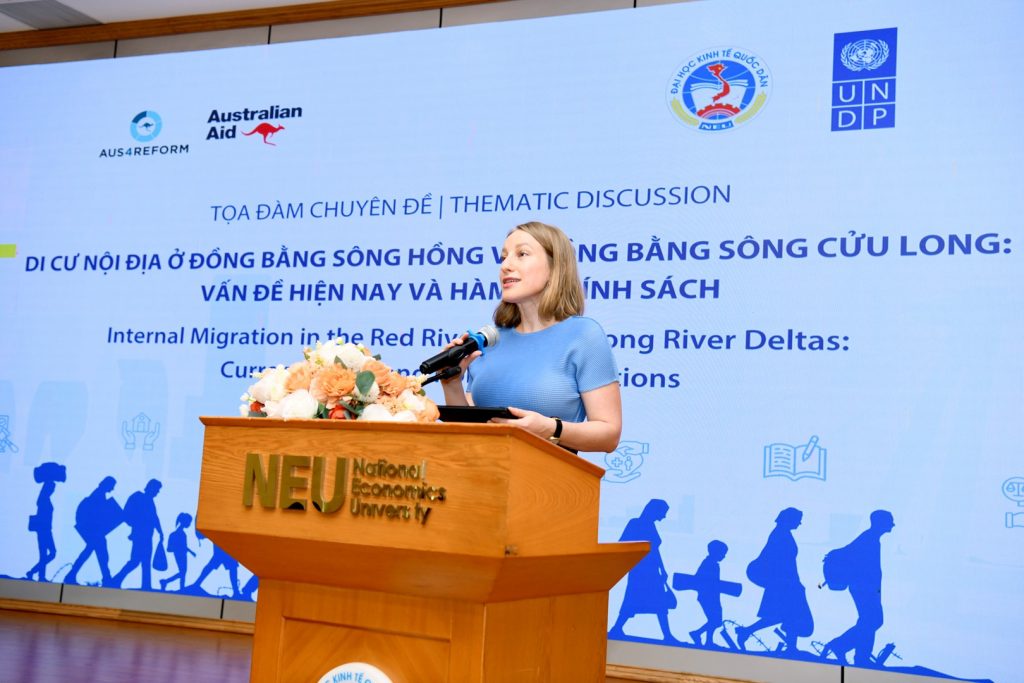
Ms. Sabina Stein, Assistant Resident Representative and Head of Governance and Participation Unit, UNDP Vietnam
Migration brings both contributions and challenges to socioeconomic development and local management. Research findings show that migration management is implemented closely in the Mekong Delta and shows signs of overload in the Red River Delta. Coordination between residence management and labor management agencies remains loose. Although most migrants comply with temporary residence registration requirements, migrants do not clearly understand or distinguish between temporary residence registration and stay notification. Additionally, policies formulated and implemented at local and provincial levels still discriminate between permanent and temporary residents. Many policies even focus only on supporting permanent residents as beneficiaries.
At the seminar, Ms. Do Le Thu Ngoc, Assistant Resident Representative and Head of Inclusive Growth Unit at UNDP Vietnam, stated: "To truly harness the potential of migration, we need to establish an environment that promotes migrants' integration with local communities at their destinations, building bridges that connect society and prosperity for everyone. Equal learning opportunities for migrants' children in destination localities will greatly support the integration process. Reducing difficulties in accessing administrative procedures in receiving provinces is also a necessary approach to support migrants."
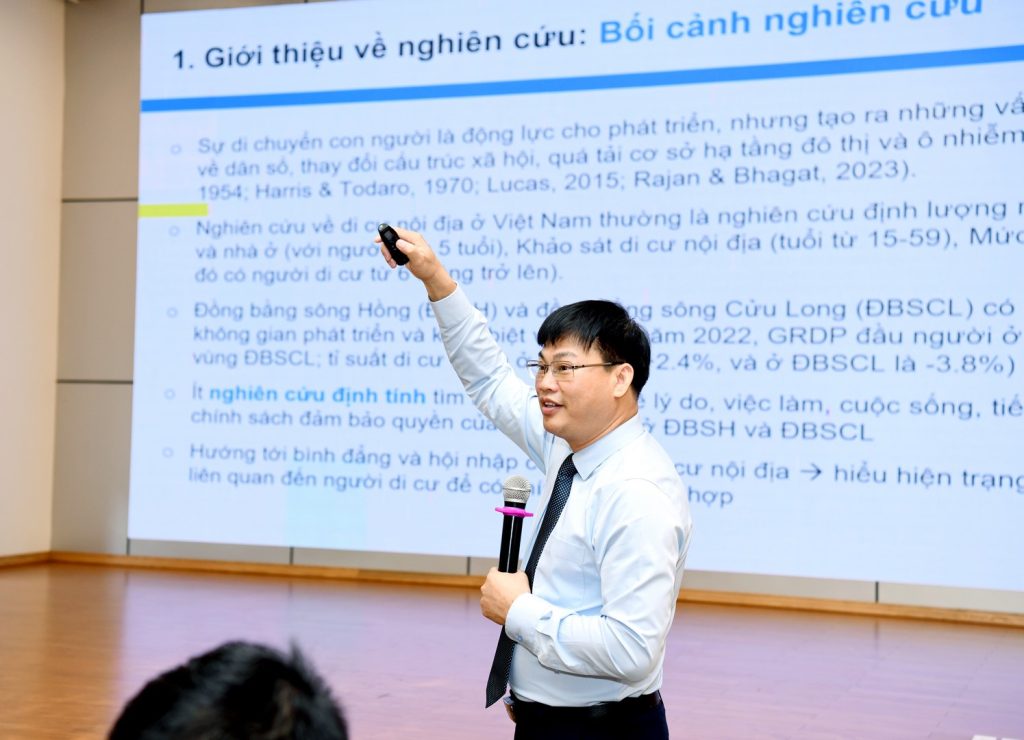
Assoc. Prof. Dr. Le Quang Canh, Director of ISD, presenting research findings at the seminar
According to research findings, the majority of migrants in the study sample have not received basic social benefits. Many unskilled migrants typically work in simple labor positions in companies or work independently in seasonal jobs, without health insurance, social insurance, including voluntary social insurance, and have not received social assistance policies at their destinations.
Notably, most migrant workers live in substandard boarding houses that are cramped, damp, moldy, lack basic amenities, and particularly fail to meet fire safety standards. The spiritual life and family relationships of migrants are fragmented, which is the root cause of many social problems that need attention and resolution. Regarding access to primary education services for children, many migrants find it difficult to access public education services. Public educational institutions in many localities show signs of overload because they cannot accurately predict the fluctuating number of students during the school year. Migrant children must study in private preschool facilities with higher costs. From a gender perspective, female migrants face more psychological, social, and community integration challenges than male migrants.
Interview results with migrants in both delta regions show that migrants rarely participate in local governance and community, cultural, and sports activities in their temporary residence areas. Migrants seldom participate in village/neighborhood group meetings and contribute opinions, and almost never participate in elections at their migration destinations.
The research also proposes many solutions and policy recommendations to ensure migrants' rights to recognition, protection, and community integration at their destinations. The state needs to plan and allocate land funds for building housing for low-income people, without discriminating between permanent residents and migrants, while diversifying forms of housing provision for workers. Additionally, for areas heavily affected by "push" factors like the Mekong Delta, pendulum migration should be encouraged, and jobs should be created in the agricultural sector in rural areas to retain labor. Simultaneously, improving convenient transportation connections so people can commute daily helps reduce pressure on housing and education services at destinations.
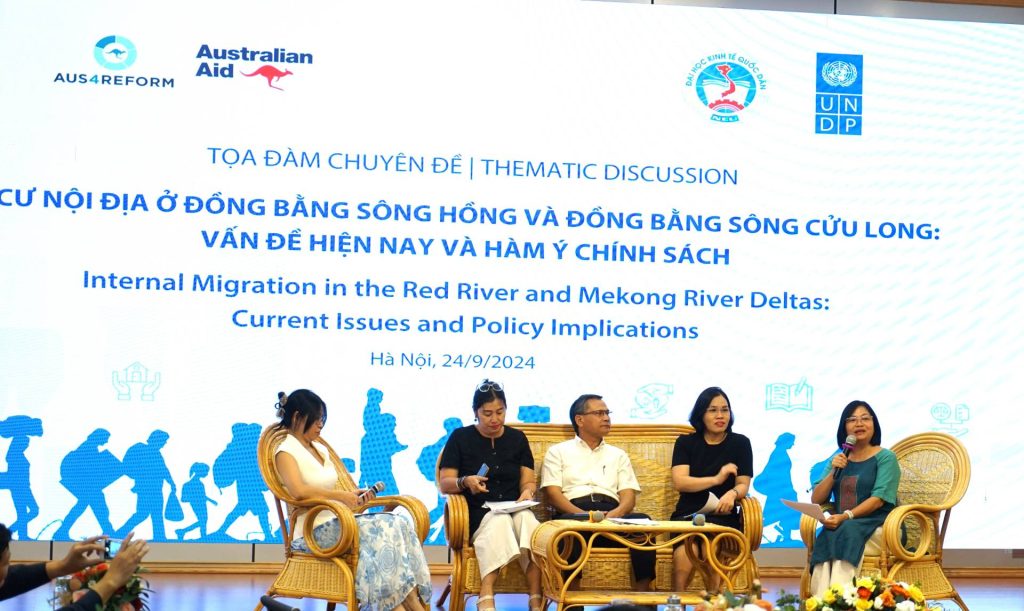
Expert discussion on research findings and related policy updates
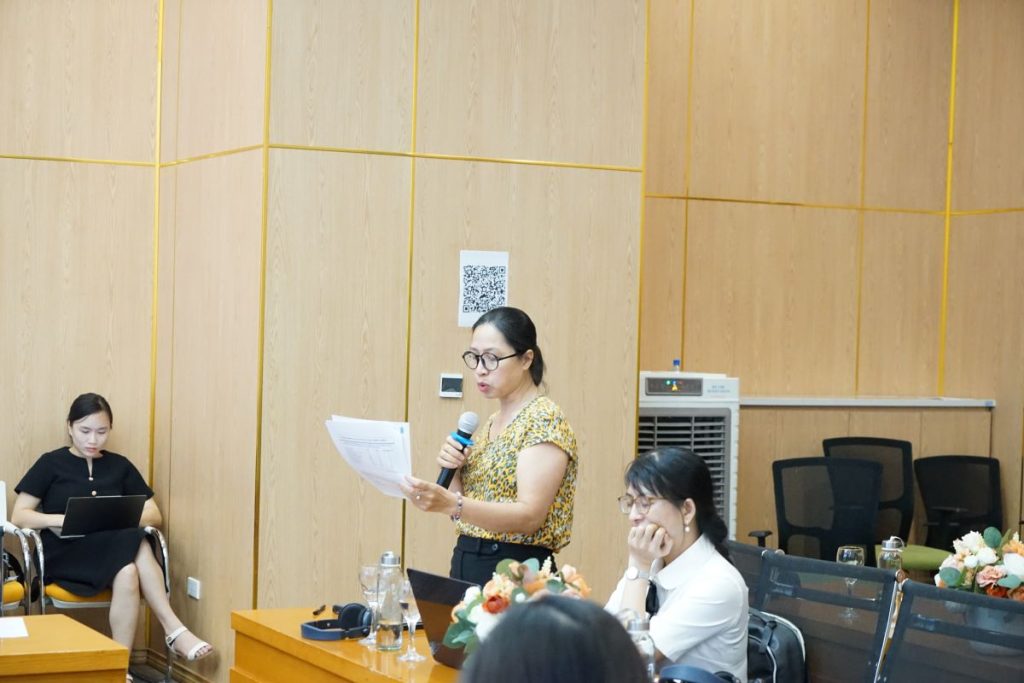
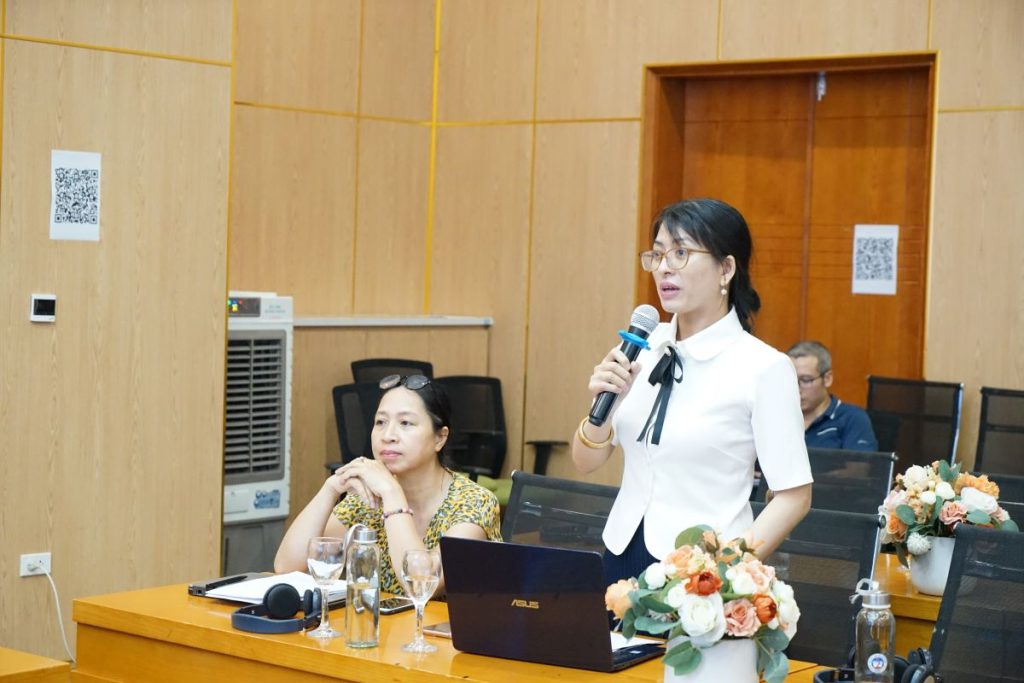
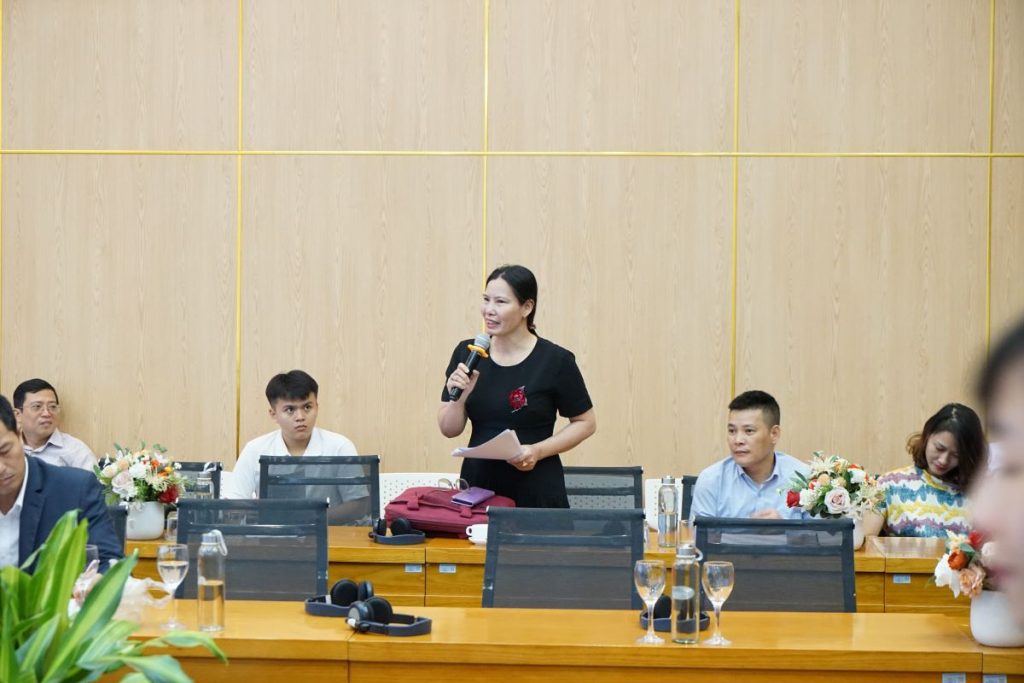
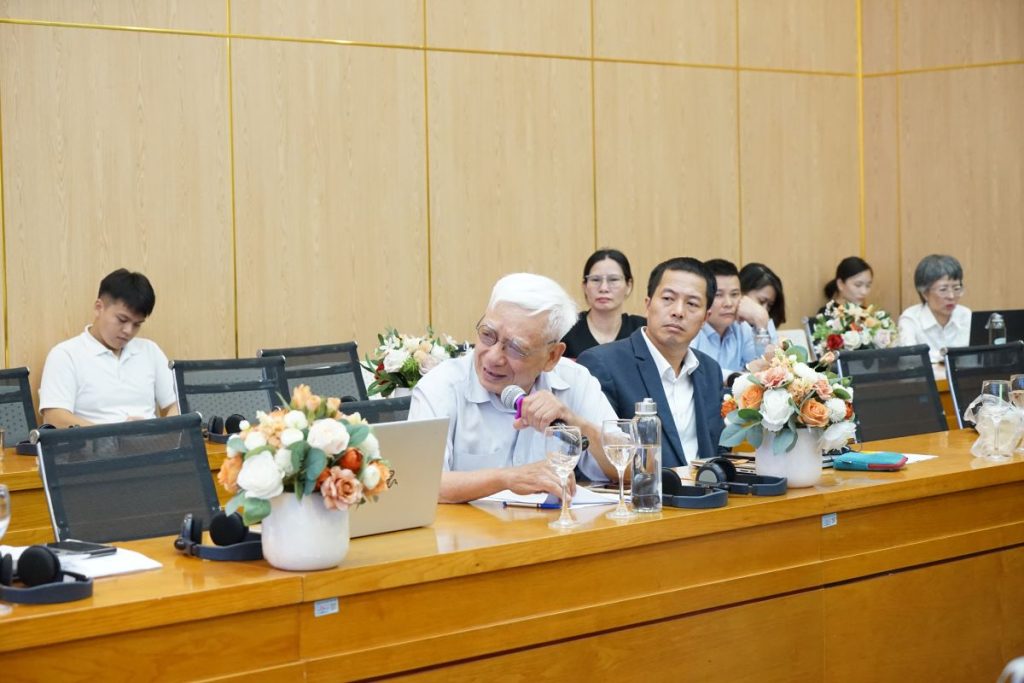
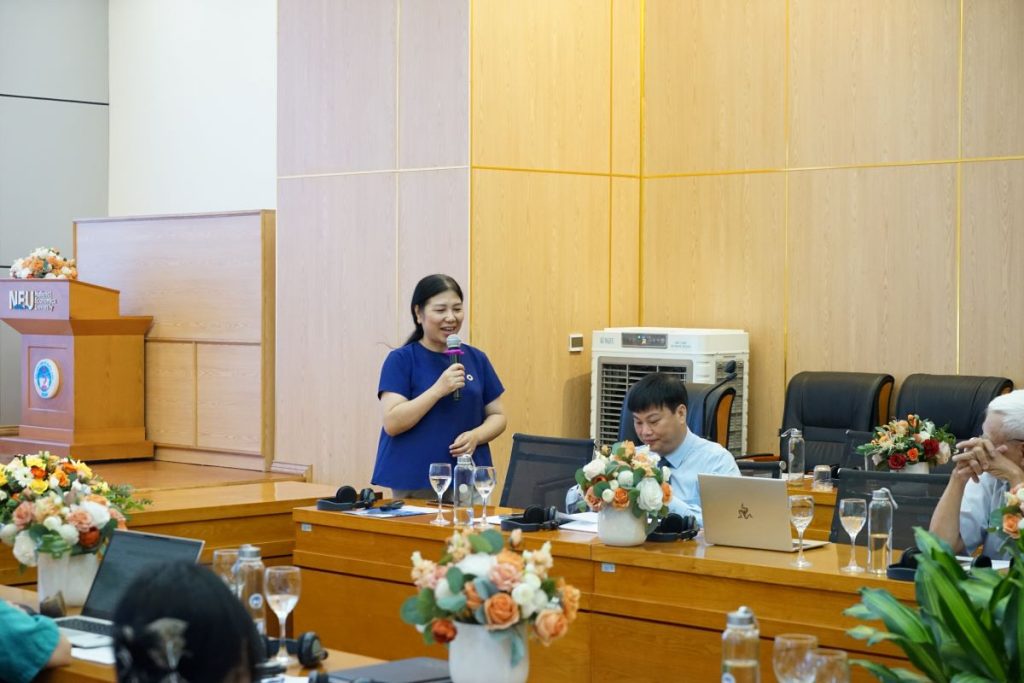
Also at the seminar, the research team received many expert contributions regarding research findings and related policy updates.
Some images from the seminar:
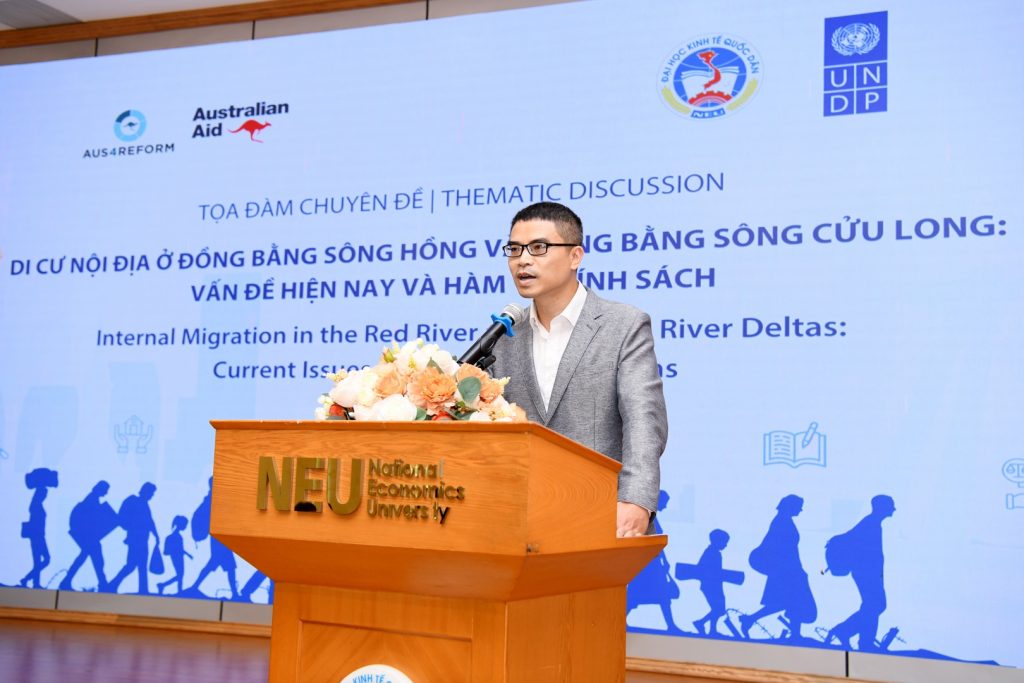
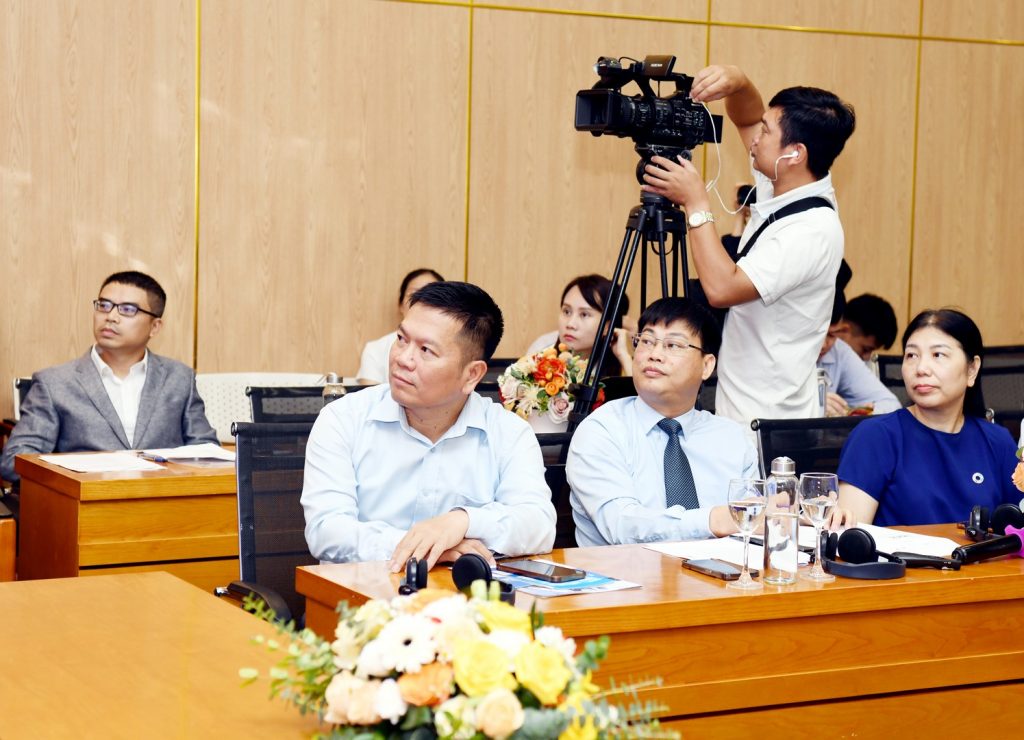
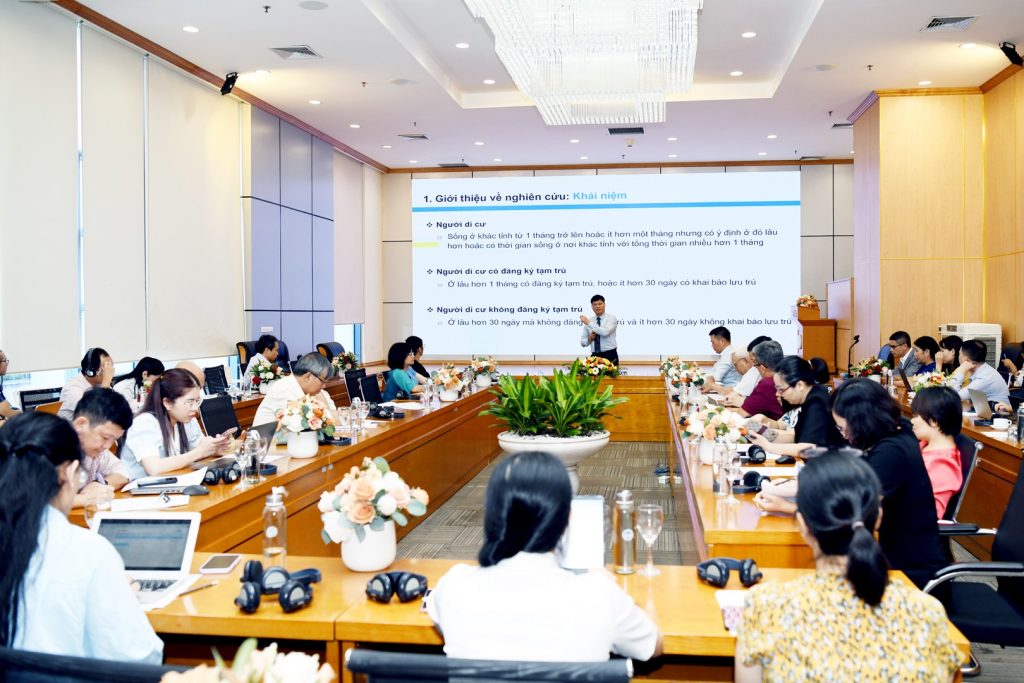
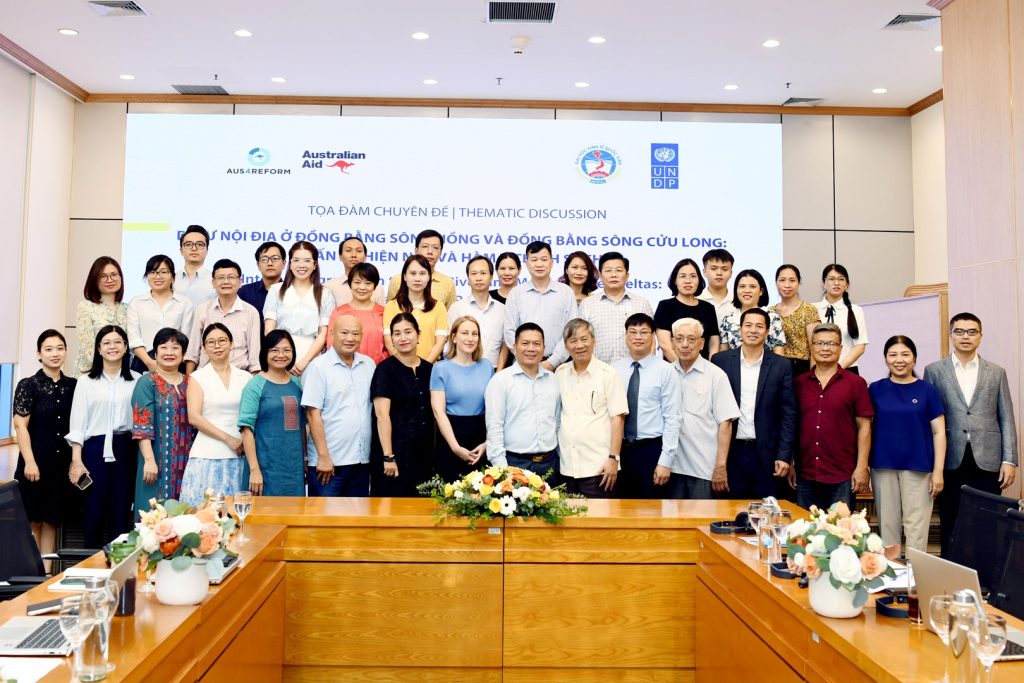
Delegates participating in the seminar taking commemorative photos
Text and Photos: Institute for Sustainable Development
Media outlets covering the seminar:
- Nhân dân: https://nhandan.vn/bao-ve-quyen-loi-nguoi-di-cu-tai-dong-bang-song-hong-va-dong-bang-song-cuu-long-post832860.html
- Báo mới: https://baomoi.com/cong-nhan-va-thuc-thi-quyen-cua-nguoi-di-cu-dieu-kien-tien-quyet-de-thuc-day-su-phat-trien-ben-vung-c50266270.epi
- Báo cáo viên: https://baocaovien.vn/tin-tuc/thuc-thi-quyen-cua-nguoi-di-cu-la-dieu-kien-de-thuc-day-phat-trien-ben-vung/151135.html
- Thời báo ngân hàng: https://thoibaonganhang.vn/cong-nhan-va-thuc-thi-quyen-cua-nguoi-di-cu-dieu-kien-tien-quyet-de-thuc-day-su-phat-trien-ben-vung-155923.html
- Báo mới: https://baomoi.com/bao-ve-quyen-loi-nguoi-di-cu-tai-dong-bang-song-hong-va-dong-bang-song-cuu-long-c50265261.epi
- VnEconomy: https://vneconomy.vn/nhieu-lao-dong-di-cu-noi-dia-muon-lam-them-gio-vi-thu-nhap-qua-thap.htm
- Chính sách cuộc sống: https://chinhsachcuocsong.vnanet.vn/cong-nhan-va-thuc-thi-quyen-cua-nguoi-di-cu-la-dieu-kien-thuc-day-su-phat-trien-ben-vung/47795.html
- Báo tài nguyên môi trường: https://baotainguyenmoitruong.vn/bao-dam-quyen-loi-va-binh-dang-cho-nguoi-dan-di-cu-380558.html
- Người đô thị: https://nguoidothi.net.vn/quyen-cua-nguoi-di-cu-dieu-kien-tien-quyet-thuc-day-phat-trien-ben-vung-45406.html
- Người đưa tin: https://www.nguoiduatin.vn/dam-bao-quyen-cua-nguoi-di-cu-la-dieu-kien-tien-quyet-de-thuc-day-su-phat-trien-ben-vung-204240924124152323.htm
- Tra cứu quy hoạch: https://tracuuquyhoach.com/tin-tuc/bao-ve-quyen-loi-nguoi-di-cu-tai-dong-bang-song-hong-va-dong-bang-song-cuu-long-50265261
- Cục Dân số Việt Nam: https://vnpa.moh.gov.vn/tin-lien-quan/toa-dam-di-cu-noi-dia-o-dong-bang-song-hong-va-dong-bang-song-cuu-long-van-de-hien-nay-va-ham-y-chinh-sach
- Công an nhân dân: https://cand.com.vn/Thi-truong/lao-dong-di-cu-chat-vat-vi-thu-nhap-qua-thap-i745218/
- Tạp chí bảo hiểm xã hội: https://tapchibaohiemxahoi.gov.vn/can-tao-co-hoi-viec-lam-de-nld-di-cu-duoc-dam-bao-an-sinh-132026.html
- The leader: https://theleader.vn/khai-thac-tiem-nang-cua-nguoi-di-cu-d36832.html
- Báo kiểm toán: http://baokiemtoan.vn/dam-bao-quyen-loi-cua-nguoi-di-cu-tao-nen-tang-de-cac-vung-dong-bang-phat-trien-ben-vung-34922.html
- Dak Lak 24h: https://daklak24h.com.vn/xa-hoi/100165/tang-co-hoi-viec-lam-cho-nguoi-di-cu.html
- Đảng cộng sản: https://dangcongsan.vn/doi-ngoai/bao-ve-quyen-va-loi-ich-chinh-dang-cua-nguoi-di-cu-565769.html
- Đại đoàn kết: https://daidoanket.vn/tang-co-hoi-viec-lam-cho-nguoi-di-cu-10291153.html
- Quốc hội TV: https://quochoitv.vn/chinh-sach-nguoi-di-cu-trong-tong-the-phat-trien-do-thi-237339.htm
- Kênh truyền hình Nhân dân: https://youtu.be/FBG8gjq-zok?si=4oPxjTqW6Z_Xm5vb
- Đài Tiếng nói Việt Nam: https://vov1.vov.gov.vn/thoi-su-21h30/thoi-su-21h30-dem-2492024-thu-tuong-pham-minh-chinh-yeu-cau-mo-dot-thi-dua-hoan-c29-121665.aspx (from the minute 12’50)
